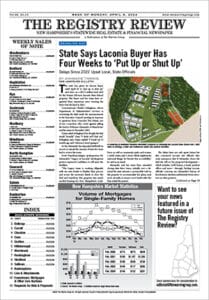
South Main Street in Hannover. The Upper Valley must build over twice the housing units in the next 10 years than were built between 2011 and 2020, a new report says.
Back in spring, Simbex was looking to expand. The Lebanon-based medical device manufacturer was hoping to grow its workforce from 32 to 46.
The hiring market was brutal; restaurants, main street stores, and businesses were struggling to entice new employees and coax back old ones. But Simbex wasn’t having trouble attracting employees. The real difficulty was finding them housing.
“We would say, ‘Okay you can start here in three months with the condition that you have a physical residence address,’ and they would report back to me that they would get an email from an apartment complex … and before they could even respond, the apartment was taken,” said Josh Lamoureux, the director of people and culture at the company. “Or they would see a Craigslist ad come up, and they would immediately email the person who’d be like, ‘Sorry, I already got 14 offers.’”
With rents climbing higher and rental openings scarce, Simbex had to adjust its hiring process. When new employees accepted their offers of employment, the company asked them to be patient. Finding a place to live – and getting started at work – could take months. Many of the recruits live out of state, as far away as Texas and California, which added to the tension.
The company has been fortunate so far. None of its hires have been scared off by the wait.
But over at Dartmouth-Hitchcock, the Lebanon-based hospital network and New Hampshire’s largest employer, executives haven’t been so lucky. During the past year, the hospital has seen a number of talented recruits eagerly apply at the prestigious hospital, only to back out reluctantly.
“Workers are saying: ‘I’m so excited to work at Dartmouth, I’ve heard great things about it, the technology, you are saving lives, you have the most critical patients in New Hampshire up there,’ and then they call back and decline because, ‘I can’t find an apartment,’” said David Duncan, vice president of facilities management at Dartmouth-Hitchcock, speaking at a recent affordable housing forum.
Current Tools Limited
As companies in New Hampshire and beyond compete for talent, the scarcity of affordable housing has become an undeniable constraint. Getting applicants and new hires interested in moving to New Hampshire is only the first step. Finding them a place to live is, for some, a higher priority.
“[If] somebody’s going to try to come to New Hampshire for a job, you want that employee to stick around,” said Rod Dapice, managing director of management and development at the New Hampshire Housing Finance Authority. “It’s more likely that they will if they can buy their first home.”
To that end, NHHFA offers a mix of tools, from down-payment assistance to mortgage credit certificates, but they can help against the market only so much.
In the Upper Valley, where rents are among the highest in the state, the dynamic has forced major players like Dartmouth-Hitchcock to muscle their way into the housing market. The way Duncan tells it, the hospital system has tried everything. Every year, the hospital hires around 975 external employees, and every year 400 to 500 of them need housing. But because about 75 percent make between $40,000 and $70,000 a year, affordable housing is difficult to find.
Median rents in the region start at around $1,900 a month. At that rate, a nurse or technician making $40,000 would need to devote 57 percent of their paychecks to rent – far more than the 30 percent recommended upper limit. If that same employee wanted an apartment that did meet the 30 percent threshold, they would need the rent to be about $1,000 a month – a near impossibility, Duncan said.
And with 98 percent of apartments occupied in the area, there aren’t a lot of opportunities to comparison shop. The problem has compounded the acute shortage of health care workers nationally, a long-running issue exacerbated by the pandemic.
“Anybody that has a health care degree or skills is being furiously recruited, anywhere,” Duncan said.
Upper Valley Must Double Construction
The workforce housing shortage is just one of a number of forces pressing on the region’s housing market, said Julia Griffin, the Hanover town manager.
Throughout the pandemic, Lebanon and its surrounding area became one of the top destinations in the country for people looking to escape urban life and buy new homes. In April, Lebanon was the metro area with the seventh biggest increase in net in-migration in the United States, according to a New York Times analysis of U.S. Postal Service data.
Meanwhile, attendance at Dartmouth College has swelled, and housing availability for graduate students and undergraduates has become equally difficult to find. The effect: Students who could be housed in new dormitories at the college are instead taking apartments that might have been filled by hospital employees and tech workers. And affluent buyers continue to use cash purchases to snap up homes, sometimes with no interest in inspections or even visits.
“A shortage of units is a shortage of units, and at the end of the day it doesn’t really matter who’s short,” Griffin says. “You just know you’re short a whole bunch of housing units and the market doesn’t work very well as a result.”
Add to that a sobering long-term picture: New Hampshire and Vermont’s Upper Valley must build around 10,000 new homes between now and 2030 in order to meet the region’s workforce needs and stabilize the housing and rental economy, Griffin says. That’s according to a report from a commission of New Hampshire and Vermont regional planning experts known as the “Keys to the Valley.” From 2011 to 2020, the region added only 4,000 new units, the report noted.
Hospital Builds Own Housing
A solution to the housing development problem is not going to happen overnight, stakeholders say. Until it does, employers are locked in frenzied competition.
At Simbex, the executive team has kicked into gear, with members frantically finding as many apartment postings as they can and passing them onto their new recruits.
“I had every single person recommending Realtors, and we pulled together as a group,” Lamoureux said. “But it was a struggle.”
Dartmouth-Hitchcock, for its part, has an employee in human resources whose sole job is to find housing for new hires. In the past six months, that employee has helped 194 people, Duncan said.
The hospital is also working to offer housing incentives to keep new employees on board when an apartment does open up, such as free rent for the first three months and subsidized rent for up to two years, Duncan said. But the hospital remains at the mercy of the market.
Dartmouth-Hitchcock has tried building its own housing on a 40-acre tract of land. But between the increased development cost and the permitting requirement, that solution is years away. For now, the hospital is partnering with as many landlords and developers as it can wrangle. They call landlords, asking what’s available now and what might be available in the future, and they’ve expanded their search radius to everything within a 30-minute drive, including all of the city of Lebanon.
“We’re working and trying to secure every single bit of inventory so that we can offer housing to our employees,” Duncan said. “So, when they apply for a job, we can say ‘Hey, guess what: We have housing,’ so that we don’t get that decline.”
That approach has had mixed results. In April, Lebanon city officials approved a proposal to convert a former hotel that had been damaged in a 2019 fire and explosion into housing units, according to the Valley News. That new hotel, the Element Hotel, which is expected to charge $1,500 to $1,900 per month, will largely be filled with Dartmouth-Hitchcock employees, one of the developers told the zoning board.
When the hospital brought together a group of recently hired employees to look at the hotel, however, some rejected it, saying it felt too much like a dorm room. And even if the hospital’s aggressive approach can lead to short-term victories, the maneuvers come at the expense of other employers, Duncan admitted.
“What is that doing? That’s hurting all of our partners’ employees around here,” he said. “We don’t have a choice. We need clinical people to take care of the patients in the hospital, and we’re fiercely competing.”
This article has been reprinted with permission from the New Hampshire Bulletin under a Creative Commons license.

